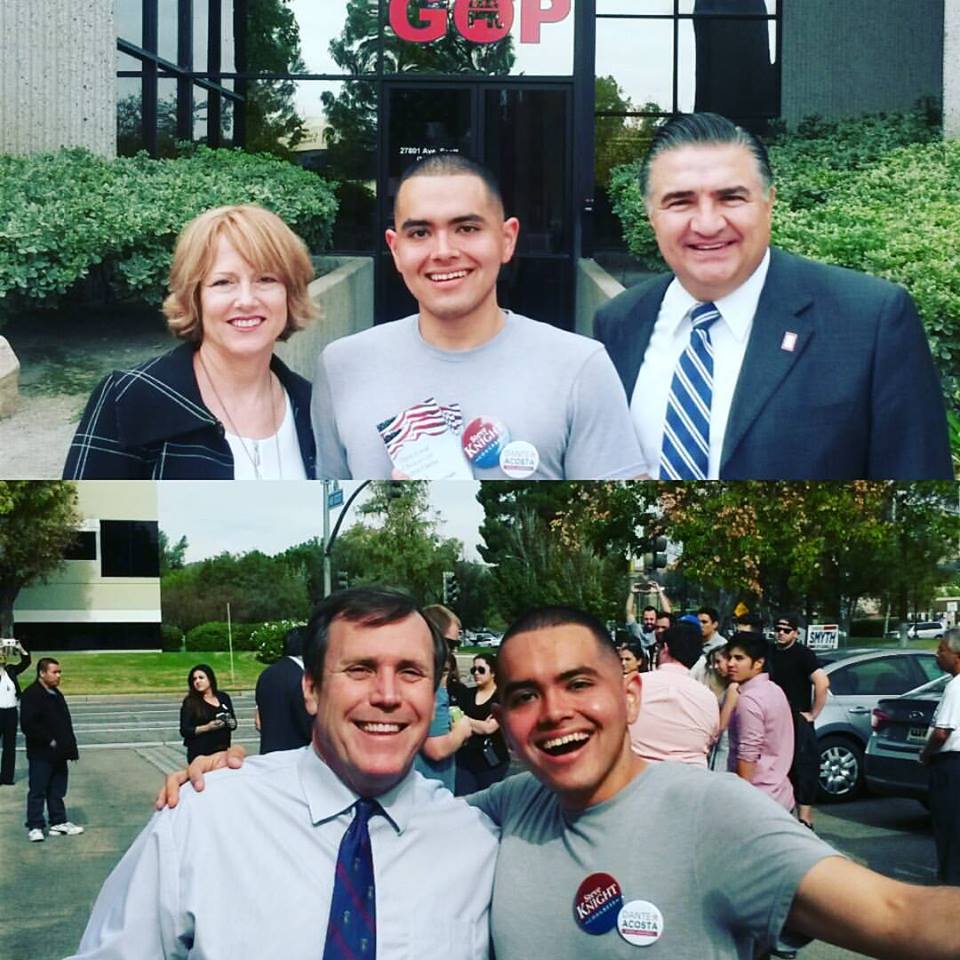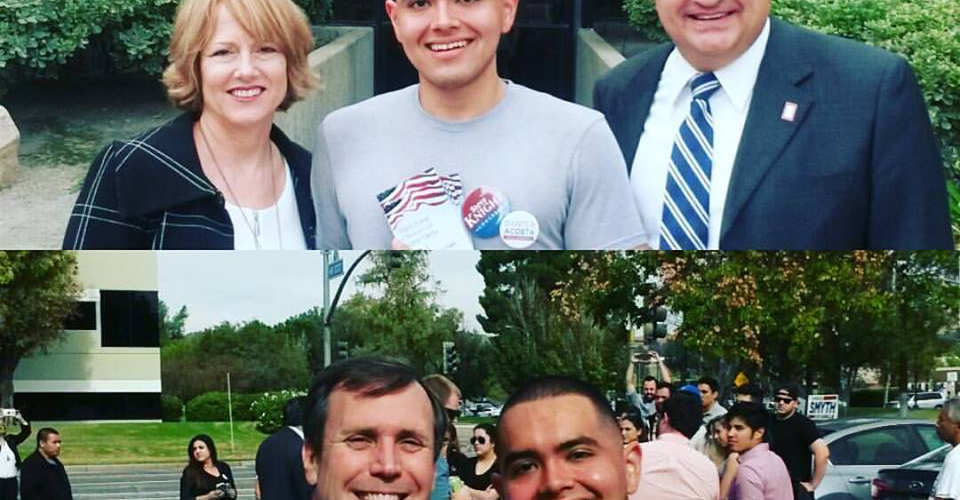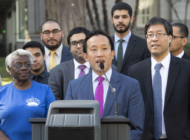“The percentage of Californians who identify as Republican now has been on the decline for the last 20 years,” CSUN professor Tom Hogen-Esch said. “I just don’t think there’s any evidence other than wishful thinking that Donald Trump is going to convince a lot of independents to buy into his governance and ideology.”
By RYAN MANCINI
EL NUEVO SOL
Coming from a police family, Tito Gonzalez enthusiastically voted for Donald Trump, with some reservations.
“How he insults everyone, how vulgar he is, no. I hate him for that level,” said Gonzalez, a Winter 2016 graduate from CSUN and a political science major. “But on his issues, [that’s] what impressed me the most…Trump was consistent. Overall, me and my family were very content with the election results.”
Gonzalez remains supportive of Trump’s pro-law enforcement stance. While he condemned the insulting nature of Trump’s rhetoric on immigration, he still maintained his allegiance to the Republican Party. His father was given amnesty to live in the US through the Immigration Reform and Control Act of 1986; he feared the increase in border security during the Clinton administration, dumbstruck as to how Latinos could possibly vote Democratic after those eight years.
“My family was kind of divided,” he said, “my dad wanted Jeb Bush, I wanted Marco Rubio, my mom wanted Ted Cruz, my siblings wanted Donald Trump.”
Watching the presidential election closely, Gonzalez began supporting Rubio and even Bernie Sanders, voting for the latter in the California primaries. He found that the system had to be rigged if the Democratic Party, not Democratic voters, wanted Hillary Clinton so desperately.
Looking toward Trump, he was amazed that he would even go to Mexico and share a stage with President Enrique Peña Nieto, shocked that they got along quite well. While their public meeting after the inauguration was canceled, Gonzalez said he will not rule out that they may have had a more secretive meeting regarding the infamous border wall and Mexico’s condition.
“Mexico’s not going to pay for it,” Gonzalez insisted. “He was just saying it to get riled up. I knew we were going to pay for the wall, I knew that from the beginning, however, is he just doing this to give a lot of shit to Mexico? Yes.”
On the other side of Gonzalez’s hometown of Santa Clarita, Bill Nering takes Trump’s rhetoric as saber rattling. Nevertheless, he voted for him with the understanding that he would get the job done.
“Let’s be clear about Trump, I don’t particularly care for that guy,” Nering, 71, said. “Some of the ways and some of his methods, his narcissism is not acceptable to me.”
Though he grew up in South Bend, Ind., Nering sympathized with Trump’s work ethic and a total rejection of what Clinton and Sanders stood for.
“JFK was my man. I love that guy. These two people I didn’t think that they had a practical application at what they were talking about,” he said about the Democratic candidates. “Trump is very strategic. He’s unbelievably strategic in the buffoonish appearance that he comes up with sometimes. The narcissistic everything, I don’t know if that’s really him. I admire Bernie, I think he would have been a great alternative to some different philosophical lines on the language, perhaps not on the concepts, you start talking communism, socialism you should be done in this country because we’ve learned that lesson a long time ago, but he’s not all that way.”
At the polls, the percentage of votes for Trump came from 31.8 percent of those who voted, according to the Los Angeles Times. Typically, California goes blue, as it did Election Day 2016. While some Republicans across the nation decided they could not vote for Trump; this included House Representative Steve Knight, who did not endorse Trump but said he was not going to vote for Clinton.

Tito Gonzalez with Assemblyman Dante Acosta and his wife Carolyn (top), and with California state senator Scott Wilk while campaigning in October 2016. (Photo credit: Curtis Raulinaitis)
This did not extend to the Republican Party of Los Angeles County, however.
“The Republican Party of Los Angeles Country affirms our support of Donald Trump as the president, and understand that there are issues that have federal jurisdiction, others that have state [jurisdiction], though a lot of the issues that Mayor Eric Garcetti and that other outspoken figures like our governor, for example, have come out with are issues of federal jurisdiction like immigration fro example,” said Haley Nieves, an intern with the Republican Party of Los Angeles County.
A student at UCLA, Nieves, 20, has according to her Facebook, presented right-wing provocateur Milo Yiannopoulos during his college tour and appeared on Fox News host Sean Hannity’s show with Trump’s sons, Donald Jr. and Eric. According to her, the party needs to have an active voice in Los Angeles in order to expand the party “by identifying new candidates to run for office in local positions and training them up in addition to doing outreach on our college campuses and our communities as well.”
CSUN professor Tom Hogen-Esch said that it is wishful thinking to make California a more purple state.
“The percentage of Californians who identify as Republican now has been on the decline for the last 20 years,” he said. “The left all over the country are more invigorated than ever. I just don’t think there’s any evidence other than wishful thinking that Donald Trump is going to convince a lot of independents to buy into his governance and ideology.”
According to the Public Policy Institute, as of May 2016, the percentage of republicans in California is at 27.3 percent. The same source said, in June 2016, that there are 23.3. percent of Californians who identify as independent or “no party preference.”
The rhetoric coming from the Trump White House has geared toward crushing any resistance that the state will provide. He has said that there is “carnage” within the state, though Nering, Gonzalez and Nieves point to California’s stance to undocumented immigration as the source of that claim. As of this writing, the state senate has approved a bill making California a sanctuary state, with hopes that Governor Jerry Brown will sign it.
The status of California versus Trump relies on the governor, according to some resources. KCET published a commentary story claiming Brown to be the shadow president of California, once again treating the state as a separate entity from the rest of the United States, a la Calexit. Hogen-Esch said all Democratic governors are filling this role.
“California’s now, essentially, a one-party state with Democrats in control of really every branch of government and they’re unified and they’re going to fight, usually, in the courts,” he said.
On Calexit, Hogen-Esch said it was absurd and that the effort of citizens wanting to create the state of Jefferson has been orchestrated by Trump voters, not by those opposing his administration.
“I went through there last summer, didn’t run into that many people. They definitely see the world through the lens of a Steve Bannon in terms of globalization as the enemy and also through the lens of racial animosity toward the demographic change,” he said.
Nering and Gonzalez do not sympathize with Brown’s intentions for resisting the Trump administration by using the Republican trope of states rights.
“California can’t survive without the rest of the US, they wouldn’t, and I don’t even know why we’d want to think that, I don’t know why. Any logical human being would want to separate the United States if they can’t get over some illegal immigration,” Nering said. “Good grief, I mean think about Nevada and California. Think about Arizona and California; just think about Oregon and California. Don’t you think there are families that are there? Immigration if it’s illegal is just illegal. It’s not going to be simple to solve. But sanctuary cities are easy to solve.”
Nering referred to Kate Steinle, the San Francisco resident who was killed by a Mexican immigrant on July 1, 2015, as “not easy to solve, she’s dead.”
Gonzalez suggests that Trump may have to invade the state, suggesting the surge in violence in Los Angeles as part of the carnage Trump speaks of. He said this invasion by the federal government could lead to a rebuilding of infrastructure while simultaneously wanting to exert his own power.
“If that kind of stuff starts happening in this country, then you’re talking about being in a completely different paradigm politically, where the national government is sending in troops to do what exactly?” Hogen-Esch said. “Occupy Sacramento? That would be unprecedented, I think we’re miles from that.”
The method of invasion could extend to Mexico, continued Gonzalez. He added that Mexico is a mess, with drugs across the nation; the over-reliance on the United States could also help Mexico lose tourism.
Hogen-Ecsh said Mexico could retaliate with its own economic power by refusing to buy American products such as corn and refusing travel to the United States.
“In terms of our relationship with Mexico, we’re probably at a low point,” he said.
Nering said Mexico is a strategic, economic powerhouse, and the US must change its net income flow while remaining friends.
“I don’t think that anybody in Mexico could look at the United States with anything other than open and loving arms,” he said. “If they do, they didn’t live my life. They can’t, without any logic, feel any harm to the United States.”
Tags: California California State University Northridge Donald Trump elecciones inmigracion Mexico política Ryan Mancini Tito Gonzalez





















